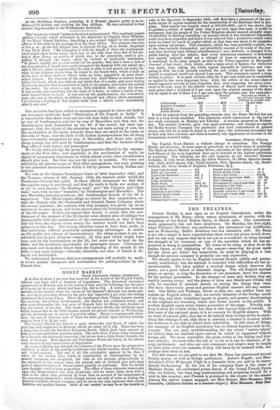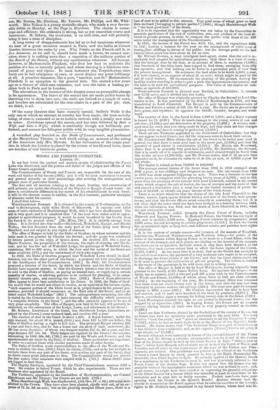THE THEATRES.
Covent Garden is now open as an English Operahouse, under the management of Mr. Bunn; whose season terminates, of course, with the reopening of the Royal Italian Opera, in March next. The commence- ment, apparently, has not been auspicious. On Monday, the first night, when Wallace's Maritana was performed, the attendance was indifferent; and on Wednesday, Belle's Bondman was less attractive still. Mr. Bunn is too old a stager to have expected that these worn-out pieces would draw; and we can only suppose that he is not yet in a condition to bring forward the strength of his company, or any of the novelties which he has an- nounced as being in preparation. He seems to be doing as they do at the Italian Opera at the beginning of the season—reserving his great cards till the town get fuller: but meanwhile, he must be playing at a loss, though his present company is probably not very expensive.
We should rejoice to see an English musical theatre solidly and perma- nently established; but the attempt is attended with difficulties all but in- surmountable. We have neither a musical drama which deserves the name, nor a good school of dramatic singing. The old English musical plays, or operas, so long the favourites of our ancestors, have few charms for the present generation. In the changes of taste and fashion they are rapidly passing away; and the pieces of Arne and Shield and Dibdin will soon be recorded in musical annals as among the things that were. Nor have those truly great and genuine English masters lett any succes- sors. Our Balfes and Wallaces, clever as they are, can neither form nor sustain an English school: they are merely imitators of the foreign music of the day, and their imitations appear to greater and greater disadvantage as the originals are becoming better and better known to the public. A modern English opera never retains possession of the stage. Novelty may keep it alive for a little while, but then it dies beyond hope of reviva1. In this state of the national opera, it is no nursery for English singers. With no want of natural gifts, they are so far behind their foreign rivals in every- thing that belongs to art, that there is scarcely a theatre in London where the audience is not able to detect their inferiority. In this state of things, the manager of an English operahouse has an almost hopeless task to en- counter. For our part, notwithstanding the cry about "native talent," we believe that our national opera cannot he raised or supported without foreign aid. We must naturalize the great works of the Italian and Ger- man schools; we must take the aid, in so far as it can be obtained, of fo- reign performers; and thus our own composers and singers may be taught by their alien rivals (or enemies, if they will have it) to contend with, and perhaps beat them at last. For this reason we are glad to see that Mr. Bunn has announced several foreign operas, as well as foreign performers. Auber's Hardie, and Men- delssohn's First Walpurgis Night in a dramatic form, are said to be imme- diately forthcoming. In the list of his company there is the name of Madame Stoltz, the celebrated prima donna of the Grand French Opera, who, we believe, has been long contemplating and preparing herself for a visit to this country; and Pischek is promised in the course of the season. Among the native singers engaged, are Miss Romer, Miss Bassano, Miss Lucombe, (hitherto known as a conoert-singer,) Miss Messent, Miss Nel- son, Mr. Reeves, Mr. Harrison, Mr. Travers, Mr. Phillips, and Mr. Whit- worth. Miss Nelson is a young contralto singer, who made a very favour- able debat on Monday, as the Page in Mariana. The chorus is nume- rous and efficient: the orchestra is strong, but as yet somewhat coarse and boisterous: M. &here, the conductor, is an able man, and will probably bring it into a state of discipline.
A long series of disappointments has led us to feel suspicious whenever we hear of a great sensation created in Paris, and the ballet at Covent Garden increases the series by one. Why Nisida, as the French call it, or Les Amazons, as we call it, should have made a furore, we cannot con- ceive, since it is nothing more than a repetition of the military portion of the Revolt of the Harem, without any amelioration whatever. All honour, however, to Mademoiselle Plunkett, who does her best to maintain the position site has so recently gained, and whose dancing is a felicitous com- pound of grace and vigour. In most instances the Terpsichorean stars burst out in full refulgency at once, or never display any great brilliancy at all. A premiere dansense, like a poet, " nascitur, non fit." Mademoiselle Plunkett is an exception to the general rule. She started a few years ago as a dancer of third-rate eminence, and now she takes a leading po- sition both in Paris and in London.
The alterations in the interior of this theatre cause no perceptible change in its appearance. The boxes of the second tier are made public boxes by throwing two or three into one; the stalls are limited to a couple of rows, and benches are substituted for the arm-chairs in a part of the pit: that, we think, is all.



























 Previous page
Previous page